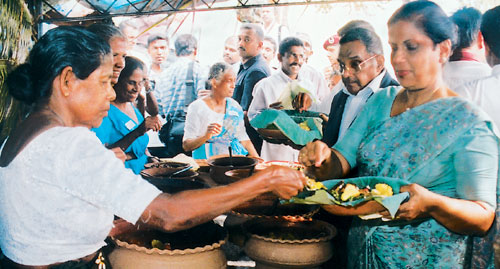| Front
Page |
||||
| PM
will support ‘National Front’
By
The Sunday Times Political Editor Joining them in the call were leading members of the clergy, business leaders and diplomats who felt a joint effort within a specific time frame and limited objectives was essential to avert a looming constitutional crisis. They have all pointed out that the peace process was the national priority. With this in mind, both President Kumaratunga and Premier Wickremesinghe will next week discuss measures aimed at ensuring the continuity of the peace process. Bernard Goonetilleke, Head of the Secretariat Co-ordinating the Peace Process (SCOPP), told The Sunday Times that President Kumaratunga's suggestion to appoint a committee "to ensure the smooth continuation between the defence authorities and the Peace Secretariat" would be one of the issues to be taken up at the meeting. President Kumaratunga made the suggestion on Friday hours after the Norwegian facilitators announced that they were suspending their role in the peace process, until the political crisis in the south is resolved. The decision to take up issues related to the peace process at the meeting between the President and the Prime Minister came after the Sri Lanka Monitoring Mission (SLMM) decided to coordinate monitoring the ceasefire agreement through the SCOPP. Both the President and Prime Minister left for Kandy over the weekend following punishing meeting schedules for both by streams of visitors urging them to work together after news that the summit meeting the two leaders held on Wednesday produced little result. Soon after the Norwegians made their surprise announcement that they would be pulling out of the peace process until the constitutional crisis between the President and Prime Minister was resolved, President Kumaratunga declared that she had assured the Norwegians that the ceasefire agreement and the freedom of movement for LTTE political cadres in areas held by the Government would be respected. The armed forces also have been instructed by the President to extend their fullest co-operation to the Sri Lanka Monitoring Mission (SLMM), a statement issued on behalf of the President said. Meanwhile, Prime Minister Wickremesinghe has indicated to the President's Adviser and former Foreign Minister Lakshman Kadirgamar that he was - in principle - prepared to work towards a National Front of sorts. During a late night discussion on Wednesday hours before Mr. Kadirgamar left on a private visit to Rumania to attend an Intellectual Property (WIPO) conference, the Prime Minister is reported to have said that he agreed to a working arrangement with President Kumaratunga. The Premier had, however, maintained that the peace process and the Defence Ministry should be in the hands of one party and had advocated the French Defence Hierarchy as a way out of the present tussle in Sri Lanka for control of the Defence Establishment. The Prime Minister
had explained that under the French system, the President was the
chairman of the Cabinet of Ministers and Chairman of the Council
of Defence. The Council
includes Cabinet Ministers and has representatives from the Ministries
of the Interior, Foreign Affairs, Finance - they map out long-term
policy, budgets etc. Both, the Prime Minister and Mr. Kadirgamar had agreed that the formation of a National Government merely to swell the ranks of the Cabinet with Ministers from all political parties was not the answer to the country's political crisis. |
||||
Copyright © 2001 Wijeya Newspapers Ltd. All rights reserved. |
